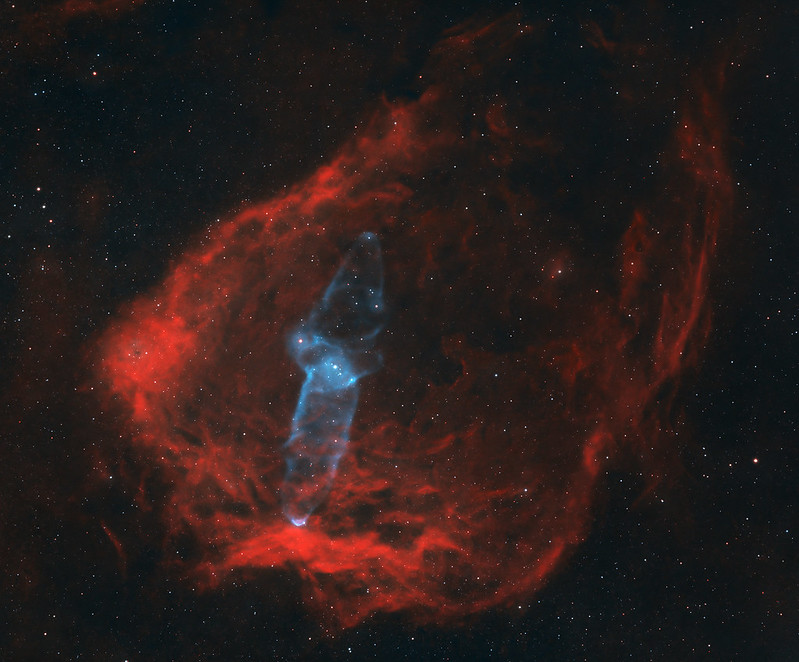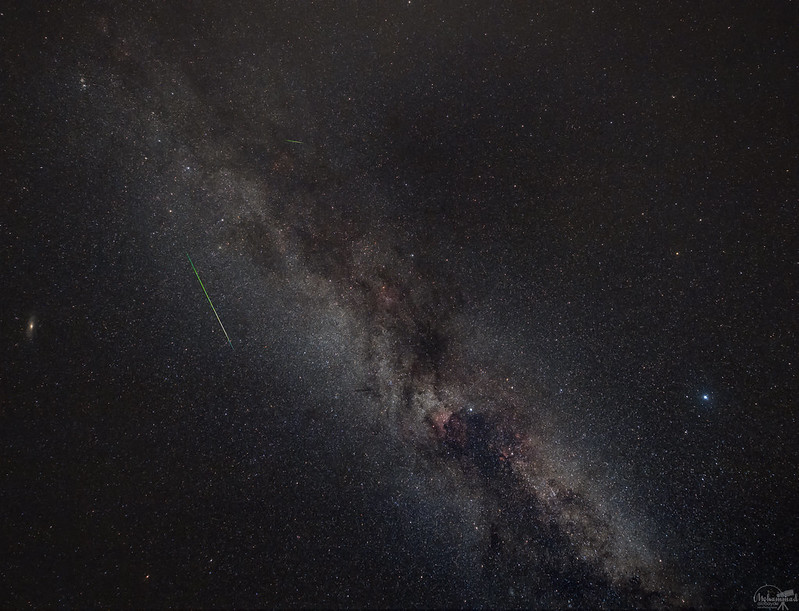Submissions: 2021 August
Re: Submissions: 2021 August
IC 1396 with Two Focal Lengths
I've decided that I want the Elephant's trunk to pop with details - took my RC 8" and added 10 hours of Ha to the wider field (280mm)
Astrodon Ha 3nm: 40x900" (10h) (gain: 120.00) -10C
Astrodon OIII 3nm: 40x900" (10h) (gain: 120.00) -10C
Astrodon SII 3nm: 40x900" (10h) (gain: 120.00) -10C
Antlia Ha 3nm Pro: 40x900" (10h) (gain: 139.00) -10C
Telescopes: Askar FRA400 F5.6 · GSO RC8"
Cameras: ZWO ASI294MM Pro · ZWO ASI1600MM Pro
Mounts: iOptron CEM26 · iOptron CEM70
Guiding cameras: ZWO ASI120MM Mini · ZWO ASI174MM mini
Focal reducers: Askar 0.7x Reducer · Astro Physics CCDT67 CCDT67
I've decided that I want the Elephant's trunk to pop with details - took my RC 8" and added 10 hours of Ha to the wider field (280mm)
Astrodon Ha 3nm: 40x900" (10h) (gain: 120.00) -10C
Astrodon OIII 3nm: 40x900" (10h) (gain: 120.00) -10C
Astrodon SII 3nm: 40x900" (10h) (gain: 120.00) -10C
Antlia Ha 3nm Pro: 40x900" (10h) (gain: 139.00) -10C
Telescopes: Askar FRA400 F5.6 · GSO RC8"
Cameras: ZWO ASI294MM Pro · ZWO ASI1600MM Pro
Mounts: iOptron CEM26 · iOptron CEM70
Guiding cameras: ZWO ASI120MM Mini · ZWO ASI174MM mini
Focal reducers: Askar 0.7x Reducer · Astro Physics CCDT67 CCDT67
-
michelmakhlouta
- Asternaut
- Posts: 8
- Joined: Tue Dec 15, 2020 2:46 pm
Re: Submissions: 2021 August
Sh2-170 - Little Rosette
Sh2-170 is a small and faint emission nebula located in Cassiopeia. Stock 18 is a small star cluster in the center of the nebula, which helped me find more information about this target. It seems to be located around 9,000 light-years away from Earth. The nebula resembles the Rosette Nebula, a famous winter target for us in the northern hemisphere, and therefore it's referred to as the little or small rosette nebula.
Full resolution: https://www.astrobin.com/full/eyxci7/0/?mod=&real=
Rig details:
Mount: Avalon Instruments Linear Fast Reverse
OTA: Sky Watcher Esprit 120ED
Camera: ZWO ASI1600MM Pro + Chroma 3nm SII/HA/OIII/RGB filters
Autoguiding: ZWO ASI290MM + ZWO OAG
Software: PHD2, SGPro, PixInsight
Integration: 72 hours
Sh2-170 is a small and faint emission nebula located in Cassiopeia. Stock 18 is a small star cluster in the center of the nebula, which helped me find more information about this target. It seems to be located around 9,000 light-years away from Earth. The nebula resembles the Rosette Nebula, a famous winter target for us in the northern hemisphere, and therefore it's referred to as the little or small rosette nebula.
Full resolution: https://www.astrobin.com/full/eyxci7/0/?mod=&real=
Rig details:
Mount: Avalon Instruments Linear Fast Reverse
OTA: Sky Watcher Esprit 120ED
Camera: ZWO ASI1600MM Pro + Chroma 3nm SII/HA/OIII/RGB filters
Autoguiding: ZWO ASI290MM + ZWO OAG
Software: PHD2, SGPro, PixInsight
Integration: 72 hours
-
cosmicwreckingball
- Ensign
- Posts: 31
- Joined: Tue May 26, 2015 2:57 pm
- AKA: Matt Harbison
- Location: Chattanooga, TN
- Contact:
Re: Submissions: 2021 August
The Cygnus Loop and the Star Gienah
Image captured and processed by Matt Harbison
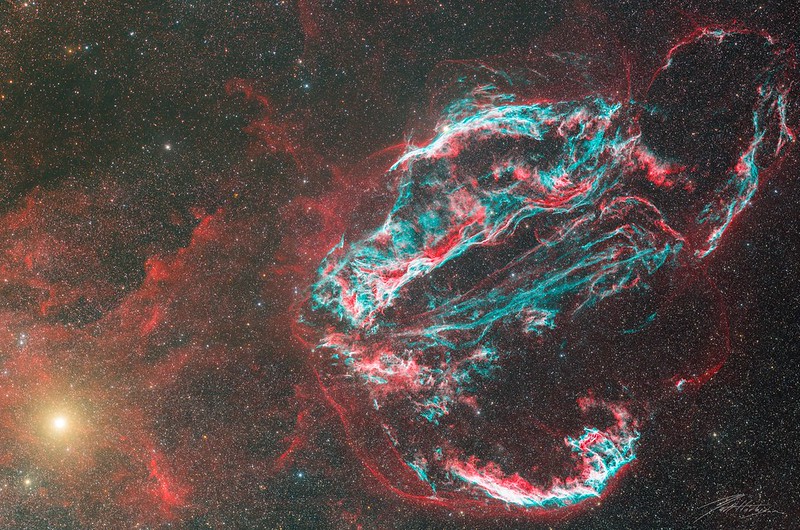
CLICK HERE FOR FULL RESOLUTION: https://www.astrobin.com/full/x37llb/0/
I call it, "The Dragon's Wing".
From Sky Safari- Epsilon Cygni is the third-brightest star in Cygnus, the Swan, at magnitude 2.46. Its traditional name is Gienah, which derives from the Arabic word for wing, "janah". However, Gamma Corvi has an identical traditional name. To differentiate them, γ Crv is referred to as Gienah Ghurab "Wing of the Raven" or Gienah Corvi; and ε Cyg as Gienah Cygni.
Thanks!
Image captured and processed by Matt Harbison

CLICK HERE FOR FULL RESOLUTION: https://www.astrobin.com/full/x37llb/0/
I call it, "The Dragon's Wing".
From Sky Safari- Epsilon Cygni is the third-brightest star in Cygnus, the Swan, at magnitude 2.46. Its traditional name is Gienah, which derives from the Arabic word for wing, "janah". However, Gamma Corvi has an identical traditional name. To differentiate them, γ Crv is referred to as Gienah Ghurab "Wing of the Raven" or Gienah Corvi; and ε Cyg as Gienah Cygni.
Thanks!
Matt Harbison
President Emeritus, Barnard Astronomical Society of Chattanooga
Cameras, Binoculars, Dobs, Cats, and Refractors. Whatever it takes!
President Emeritus, Barnard Astronomical Society of Chattanooga
Cameras, Binoculars, Dobs, Cats, and Refractors. Whatever it takes!
Re: Submissions: 2021 August
Variable star Wolf Rayet 134 in narrowband using HOO palette. Bubble nebula is the result of strong radiation and stellar winds from the star. It is 4 times the size of the sun with a 63.00K temperature that makes it 400.000 times brighter than our sun.

Full resolution image on https://www.dropbox.com/s/k9dhu4nejp5r6 ... 1.jpg?dl=0

Full resolution image on https://www.dropbox.com/s/k9dhu4nejp5r6 ... 1.jpg?dl=0
-
barretosmed
- Science Officer
- Posts: 484
- Joined: Thu Oct 12, 2017 6:04 pm
Re: Submissions: 2021 August
MOON
BEST DETAILS
https://www.astrobin.com/full/xxmomo/0/
EQUIPMENT:
APO 150MM TRIPLET
ZWO ASI 6200mc
08/10/2021
SAO PAULO-SP
Copyright: Fernando Oliveira de Menezes
Email: Barretosmed@hotmail.com
BEST DETAILS
https://www.astrobin.com/full/xxmomo/0/
EQUIPMENT:
APO 150MM TRIPLET
ZWO ASI 6200mc
08/10/2021
SAO PAULO-SP
Copyright: Fernando Oliveira de Menezes
Email: Barretosmed@hotmail.com
Re: Submissions: 2021 August
Sh2-129/OU4
Copyright: Bogdan Bordeianu Technical details:
Scope: Askar FRA 400 + x0.8 f3.9 reducer
Camera: ZWO Asi 1600mm pro, Gain 139
Imaging platform: ZWO AsiAir Pro
Guiding: Sky Watcher Heq5 Pro, ZWO Asi 224Mc, William Optics uniguide
Total exposure time: 35 hours
Frames: H 93 x 300s, O 327 x 300s
Antlia3nm Pro Ha & OIII Narrowband filters
Copyright: Bogdan Bordeianu Technical details:
Scope: Askar FRA 400 + x0.8 f3.9 reducer
Camera: ZWO Asi 1600mm pro, Gain 139
Imaging platform: ZWO AsiAir Pro
Guiding: Sky Watcher Heq5 Pro, ZWO Asi 224Mc, William Optics uniguide
Total exposure time: 35 hours
Frames: H 93 x 300s, O 327 x 300s
Antlia3nm Pro Ha & OIII Narrowband filters
-
HugoLandolfi
Re: Submissions: 2021 August
IC 4628
Copyright: Hugo Landolfi Full size image: https://www.dropbox.com/s/0f74ylp6o06qe ... 8.png?dl=0
Telescope: Meade Series 6000 130 APO
Mount: iOptron cem70
25 x 600s Ha Astrodon 3 nm Filter
25 x 600s OIII Astrodon 3 nm Filter
15 x 600s SII Astrodon 5 nm Filter
Procesed in Pixinsight.
Image was taken 15-20 June 2021 from San Isidro, Buenos Aires, Argentina.
Hugo Landolfi
Copyright: Hugo Landolfi Full size image: https://www.dropbox.com/s/0f74ylp6o06qe ... 8.png?dl=0
Telescope: Meade Series 6000 130 APO
Mount: iOptron cem70
25 x 600s Ha Astrodon 3 nm Filter
25 x 600s OIII Astrodon 3 nm Filter
15 x 600s SII Astrodon 5 nm Filter
Procesed in Pixinsight.
Image was taken 15-20 June 2021 from San Isidro, Buenos Aires, Argentina.
Hugo Landolfi
-
mathewbrowne
- Ensign
- Posts: 31
- Joined: Mon Jan 16, 2017 11:17 pm
- Contact:
Re: Submissions: 2021 August
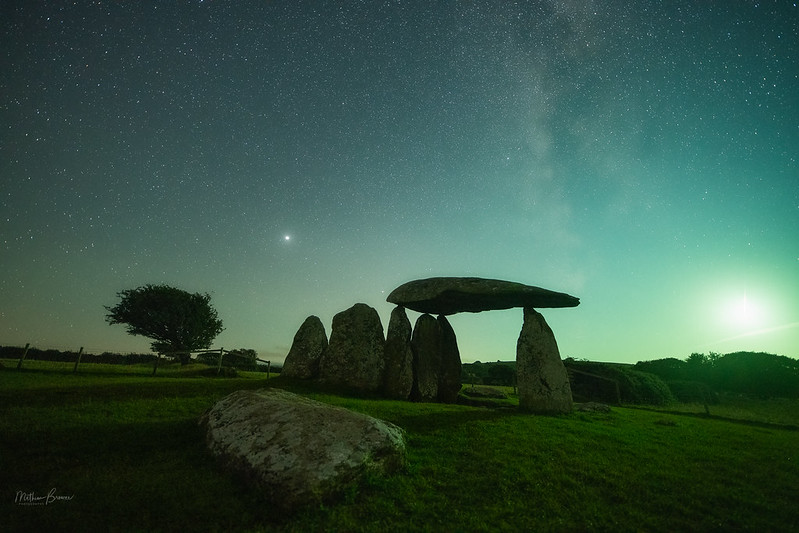
Pentre Ifan Fireball by Mathew Browne, on Flickr
I went out to photograph the Perseid meteor shower at ancient Pentre Ifan Burial Chamber in Pembrokeshire, and caught this HUGE fireball at 2am which lit everything green
- the_astronomy_enthusiast
- Ensign
- Posts: 98
- Joined: Fri Apr 16, 2021 10:16 pm
- Contact:
Re: Submissions: 2021 August
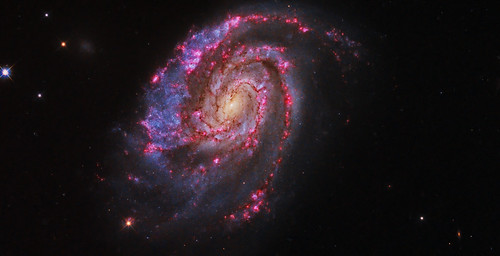
NGC6984 by William Ostling, on Flickr
All data was taken by Hubble's Advanced Camera for Surveys (ACS).
This object was a lot of fun to process! I love adding h-alpha to continuum data, and this was no exception.
Details:
Data was taken from the following proposals:
https://archive.stsci.edu/proposal_sear ... t&id=13782
Red: 814w + 665n
Green: 555w
Blue: 435w
Processing(all in pixinsight)
- crop
- color calibrate rgb
- subtract red from h alpha to just get starforming regions
- boost red and a bit of blue with h alpha
- stretch
- combine with l data
- multiscale processing
https://theastroenthusiast.com/
http://www.instagram.com/the_astronomy_enthusiast/
Last edited by the_astronomy_enthusiast on Sat Aug 14, 2021 3:03 pm, edited 1 time in total.
-
barretosmed
- Science Officer
- Posts: 484
- Joined: Thu Oct 12, 2017 6:04 pm
Re: Submissions: 2021 August
THE LONE GLOBULAR CLUSTER M30 IN THE CONSTELLATION CAPRICORNUS
M30 is a globular cluster, located in the constellation Capricornus, about 28,000 light-years from Earth.
It was discovered in 1764 by the French astronomer Charles Messier, this cluster is little photographed and difficult to locate, it is not visible to the naked eye, with an apparent magnitude of 7.2, its main reference being the 41-Cap star (located in the upper left corner of image).
The core of M30 exhibits a very dense population of stars and has suffered a core collapse, similar to some other clusters in the Milky Way.
Due to its retrograde orbit through the inner galactic halo, this cluster is believed to have been acquired from a satellite galaxy in the past.
BEST DETAILS:
https://www.astrobin.com/full/f30jeg/0/
EQUIPMENT:
ZWO ASI 6200MC PRO COLED
Espirit 150mm
83x 100sec
Date: 07/10/2021
Location: Jales-SP-Brazil
NAME: Fernando Oliveira de Menezes
E-MAIL: Barretosmed@hotmail.com
M30 is a globular cluster, located in the constellation Capricornus, about 28,000 light-years from Earth.
It was discovered in 1764 by the French astronomer Charles Messier, this cluster is little photographed and difficult to locate, it is not visible to the naked eye, with an apparent magnitude of 7.2, its main reference being the 41-Cap star (located in the upper left corner of image).
The core of M30 exhibits a very dense population of stars and has suffered a core collapse, similar to some other clusters in the Milky Way.
Due to its retrograde orbit through the inner galactic halo, this cluster is believed to have been acquired from a satellite galaxy in the past.
BEST DETAILS:
https://www.astrobin.com/full/f30jeg/0/
EQUIPMENT:
ZWO ASI 6200MC PRO COLED
Espirit 150mm
83x 100sec
Date: 07/10/2021
Location: Jales-SP-Brazil
NAME: Fernando Oliveira de Menezes
E-MAIL: Barretosmed@hotmail.com
Re: Submissions: 2021 August
Hello,
I Just finished this project (literally as I'm typing this...)
I hope you will like it.
Full resolution:
https://pbase.com/tango33/new_images
All the best,
Kfir Simon
imaging data:
Taken over 11 nights in August 2021
Imaging dates 4-14 - every 2 nights
(all images were taken at about 22:00 UTC)
16" F8 Hypergraph telescope
FLI 16803 camera.
ASA DDM 160 Mount.
Tivoli farm Namibia
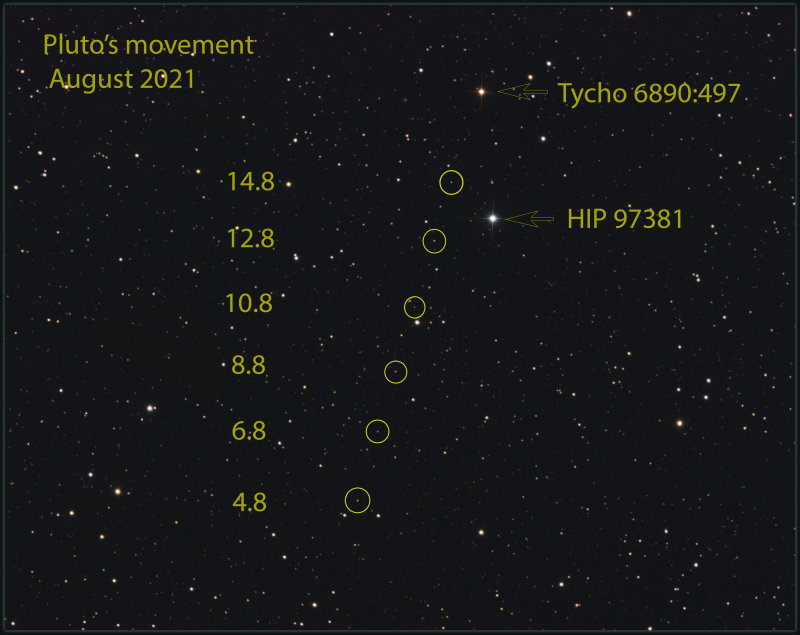
I Just finished this project (literally as I'm typing this...)
I hope you will like it.
Full resolution:
https://pbase.com/tango33/new_images
All the best,
Kfir Simon
imaging data:
Taken over 11 nights in August 2021
Imaging dates 4-14 - every 2 nights
(all images were taken at about 22:00 UTC)
16" F8 Hypergraph telescope
FLI 16803 camera.
ASA DDM 160 Mount.
Tivoli farm Namibia

-
Bai Maolin
Re: Submissions: 2021 August
Perseids
https://500px.com.cn/community/photo-de ... 330977b0a8
Taken by Bai Maolin, on 13th August 2021 in Guoluo, Qinghai Province, China.
https://500px.com.cn/community/photo-de ... 330977b0a8
Taken by Bai Maolin, on 13th August 2021 in Guoluo, Qinghai Province, China.
- Robin_Onderka
- Ensign
- Posts: 47
- Joined: Sat Mar 07, 2020 6:54 pm
Re: Submissions: 2021 August
Milky Way and Red Sprites
Copyright: Robin Onderka / www.instagram.com/robin_onderka
This photo was taken when I was setting the exposure with the model at Punta Planka, Ražanj (Croatia). However, it carries one very rare light phenomenon, the red sprites. This large electric discharge, which you can see to the left just above the horizon, occured high above thunderstorm clouds somewhere over the Adriatic Sea. And it was this millisecond flash that appeared just at the same time as the camera was capturing the center of the Milky Way and model looking at a beacon in the background.
Canon 6D (astro-modified), Samyang 24 mm f/1.4, Lee Soft 3 filter, tripod
10 sec, f/2.5 ISO 6400
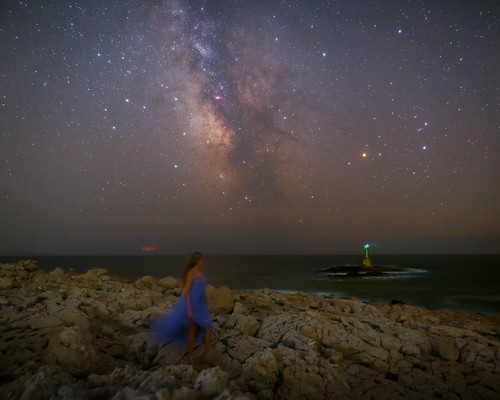 Milky Way and Red sprites by Robin Onderka, on Flickr
Milky Way and Red sprites by Robin Onderka, on Flickr
Copyright: Robin Onderka / www.instagram.com/robin_onderka
This photo was taken when I was setting the exposure with the model at Punta Planka, Ražanj (Croatia). However, it carries one very rare light phenomenon, the red sprites. This large electric discharge, which you can see to the left just above the horizon, occured high above thunderstorm clouds somewhere over the Adriatic Sea. And it was this millisecond flash that appeared just at the same time as the camera was capturing the center of the Milky Way and model looking at a beacon in the background.
Canon 6D (astro-modified), Samyang 24 mm f/1.4, Lee Soft 3 filter, tripod
10 sec, f/2.5 ISO 6400
 Milky Way and Red sprites by Robin Onderka, on Flickr
Milky Way and Red sprites by Robin Onderka, on Flickr-
Lefty's Astrophotography
- Ensign
- Posts: 21
- Joined: Mon Mar 16, 2020 12:32 am
Re: Submissions: 2021 August
My photo of the Western Veil Nebula
This is 17 hours of narrowband exposure from my Bortle 6 driveway earlier this summer. Captured using a 6" f/4 newtonian, ASI1600, and astrodon filters on an Orion Sirius mount.
Direct link to the full res image: https://live.staticflickr.com/65535/512 ... 87f2_o.png
Full acquisition/processing details can be found here: https://www.flickr.com/photos/leftysast ... 1280356673
This is 17 hours of narrowband exposure from my Bortle 6 driveway earlier this summer. Captured using a 6" f/4 newtonian, ASI1600, and astrodon filters on an Orion Sirius mount.
Direct link to the full res image: https://live.staticflickr.com/65535/512 ... 87f2_o.png
Full acquisition/processing details can be found here: https://www.flickr.com/photos/leftysast ... 1280356673
Re: Submissions: 2021 August
Perseid Meteor Shower Cave
The Photo was taken through two nights 11-12 and 13-14 Aug from Egyptian Desert, the white desert protectorate , Egypt .
to make this photo we are taking around 700 photos and we chose the best with meteors, the photo was taken from the cave with lime stone roof and the floor is covered by sand
 Perseid Meteor shower low by osama Fathi, on Flickr
Perseid Meteor shower low by osama Fathi, on Flickr
title :
"Even if you are in the cave you can capture Perseid Meteor Shower
Settings:
Camera Nikon Z6, Nikkor 14-24 mm
Milky way :tracked 2 min , 14mm, ISO 2500
Foreground : 14 mm, ISO 800
Meteors: 23*20sec, 14 mm, ISO 5000
High Resolution:
www.flickr.com/photos/191473140@N06/51381146072
Softwares:
Photoshop, ,
Credits: Osama Fathi
Thank You very much
The Photo was taken through two nights 11-12 and 13-14 Aug from Egyptian Desert, the white desert protectorate , Egypt .
to make this photo we are taking around 700 photos and we chose the best with meteors, the photo was taken from the cave with lime stone roof and the floor is covered by sand
 Perseid Meteor shower low by osama Fathi, on Flickr
Perseid Meteor shower low by osama Fathi, on Flickrtitle :
"Even if you are in the cave you can capture Perseid Meteor Shower
Settings:
Camera Nikon Z6, Nikkor 14-24 mm
Milky way :tracked 2 min , 14mm, ISO 2500
Foreground : 14 mm, ISO 800
Meteors: 23*20sec, 14 mm, ISO 5000
High Resolution:
www.flickr.com/photos/191473140@N06/51381146072
Softwares:
Photoshop, ,
Credits: Osama Fathi
Thank You very much
- the_astronomy_enthusiast
- Ensign
- Posts: 98
- Joined: Fri Apr 16, 2021 10:16 pm
- Contact:
Re: Submissions: 2021 August
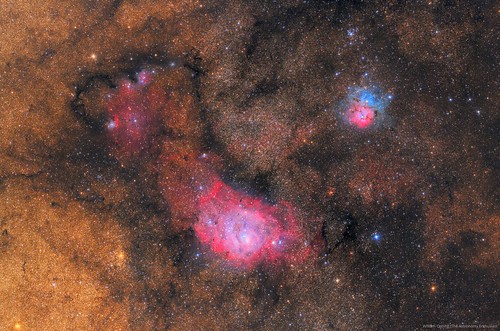
A Sagittarius triplet – M8, M20, and NGC 6559 by William Ostling, on Flickr
This so far is my favorite image! Nearly 21 hours of data (taken across 4! nights) and 3 hours of processing went into this huge project. I love the color range so much - golden milky way stars, pink lagoon nebula, and light blue trifid reflection.
Some general details that I am proud of:
- taken across 4 nights (8/7/2021, 8/8/2021, 8/11/2021, 8/14/2021)
- used my old violin strings to create diffraction spikes
- I temperature matched the dark frames more accurately than I had dome before.
I hope you enjoy! Thanks for considering.
-
barretosmed
- Science Officer
- Posts: 484
- Joined: Thu Oct 12, 2017 6:04 pm
Re: Submissions: 2021 August
MOON IN COLOR
This image is not a mosaic
BEST DETAIL: https://www.astrobin.com/full/cg4fdc/B/
The moon is usually seen in subtle shades of gray or yellow.
The different colors are recognized to correspond to actual differences in the chemical composition of the lunar surface. Blue hues reveal areas rich in ilmenite, which contains iron, titanium and oxygen, mainly titanium, while orange and purple show relatively poor titanium and iron regions.
White areas are taller areas that are most exposed to the sun.
Trips to the moon have already been indicated by similar images.
EQUIPAMENTS:
ZWO ASI 6200MC COLED
ESPIRIT 150MM
08/15/2021
Time: 22:06
Local: Sao Paulo - SP - Brazil
Processing and capture:
Software:, Photoshop CS6, SharpCap V3.0 Sharcap, AutoStakkert AutoStackert!, Registax 6, PhotoScape
NAME: Fernando Oliveira de Menezes
EMAIL: Barrteosmed@hotmail.com
This image is not a mosaic
BEST DETAIL: https://www.astrobin.com/full/cg4fdc/B/
The moon is usually seen in subtle shades of gray or yellow.
The different colors are recognized to correspond to actual differences in the chemical composition of the lunar surface. Blue hues reveal areas rich in ilmenite, which contains iron, titanium and oxygen, mainly titanium, while orange and purple show relatively poor titanium and iron regions.
White areas are taller areas that are most exposed to the sun.
Trips to the moon have already been indicated by similar images.
EQUIPAMENTS:
ZWO ASI 6200MC COLED
ESPIRIT 150MM
08/15/2021
Time: 22:06
Local: Sao Paulo - SP - Brazil
Processing and capture:
Software:, Photoshop CS6, SharpCap V3.0 Sharcap, AutoStakkert AutoStackert!, Registax 6, PhotoScape
NAME: Fernando Oliveira de Menezes
EMAIL: Barrteosmed@hotmail.com
-
thomasroell
- Ensign
- Posts: 28
- Joined: Tue Oct 27, 2020 7:23 pm
Re: Submissions: 2021 August
M31, the Andromeda Galaxy 
What would you image if you want to test the capabilities of your new camera?
So many options, but I settled on M31 for starters.
I’ve shot this great Galaxy already a few times with different setups so I could do a proper comparison.
And to cut a long story short; it does the job brilliantly! Although the camera lacks some megapixels compared to my dslr, the advantages of cooling and much higher sensitivity clearly outweighs the disadvantage of ‘only’ 9mp.
The Ha region clearly showed up in the longer exposure through the dual narrowband filter.
The Andromeda is part of the Local Group, together with the Triangulum Galaxy, a few dozen satellite galaxies and dwarf galaxies, our closest neighbors in the vast universe. Only 2.5 million light years away..
Two of M31’s satellites are visible in the picture, below is M32 and above the nucleus to the left is M110.
RGB 36 x 180sec gain 101, cooled to -15C
HOO 21 x 600sec gain 101, cooled to -15C
🖥 Edited in AstroPixel Processor, Photoshop and Lightroom
.
 Sky-watcher HEQ5, Sharpstar 61EDPH Triplet APO, Svbony 60 mm guidescope with a ZWO ASI120MM guidecamera.
Sky-watcher HEQ5, Sharpstar 61EDPH Triplet APO, Svbony 60 mm guidescope with a ZWO ASI120MM guidecamera.
🕹ZWO ASIAIR Pro
 ZWO ASI533MC Pro
ZWO ASI533MC Pro
What would you image if you want to test the capabilities of your new camera?
So many options, but I settled on M31 for starters.
I’ve shot this great Galaxy already a few times with different setups so I could do a proper comparison.
And to cut a long story short; it does the job brilliantly! Although the camera lacks some megapixels compared to my dslr, the advantages of cooling and much higher sensitivity clearly outweighs the disadvantage of ‘only’ 9mp.
The Ha region clearly showed up in the longer exposure through the dual narrowband filter.
The Andromeda is part of the Local Group, together with the Triangulum Galaxy, a few dozen satellite galaxies and dwarf galaxies, our closest neighbors in the vast universe. Only 2.5 million light years away..
Two of M31’s satellites are visible in the picture, below is M32 and above the nucleus to the left is M110.
RGB 36 x 180sec gain 101, cooled to -15C
HOO 21 x 600sec gain 101, cooled to -15C
🖥 Edited in AstroPixel Processor, Photoshop and Lightroom
.
🕹ZWO ASIAIR Pro
-
thomasroell
- Ensign
- Posts: 28
- Joined: Tue Oct 27, 2020 7:23 pm
Re: Submissions: 2021 August
The Soul Nebula
While the rain lashed against the windows for the last few days, I took the opportunity to edit this data I shot a few weeks ago.
It such a diverse target. When really looking close you’ll find walls of gas, not unlike the famous Cygnus Wall.
The Soul Nebula (Westerhout 5) is an emission nebula located in the constellation Cassiopeia.
—————————————————————————
RGB 41 x 600 iso 3200
Total exposure time 6 hours 50 minutes
🖥 Edited in AstroPixel Processor, Photoshop and Lightroom
.
 Sky-watcher HEQ5, TS Optics 115 f/7 Triplet APO, Svbony 60 mm guidescope with a ZWO ASI120MM guidecamera.
Sky-watcher HEQ5, TS Optics 115 f/7 Triplet APO, Svbony 60 mm guidescope with a ZWO ASI120MM guidecamera.
🕹ZWO ASIAIR Pro
 Canon EOS 6Da, Optolong L-Enhance filter
Canon EOS 6Da, Optolong L-Enhance filter
While the rain lashed against the windows for the last few days, I took the opportunity to edit this data I shot a few weeks ago.
It such a diverse target. When really looking close you’ll find walls of gas, not unlike the famous Cygnus Wall.
The Soul Nebula (Westerhout 5) is an emission nebula located in the constellation Cassiopeia.
—————————————————————————
RGB 41 x 600 iso 3200
Total exposure time 6 hours 50 minutes
🖥 Edited in AstroPixel Processor, Photoshop and Lightroom
.
🕹ZWO ASIAIR Pro
Re: Submissions: 2021 August
On top of the south of the world
Copyright: Marcelo Maturana Rodríguez (@matuutex)
Location: Osorno volcano, Chile
Instagram: http://www.instagram.com/matuutex
Copyright: Marcelo Maturana Rodríguez (@matuutex)
Location: Osorno volcano, Chile
Instagram: http://www.instagram.com/matuutex
Re: Submissions: 2021 August
It's a dusty galaxy out there!

LDN 673, a dark nebula in Aquila. This is 18 hours of LRGB data taken at Sierra Remote Observatories with a Planewave CDK14 and an FLI Proline 16803. All the technical details are on astrobin: https://www.astrobin.com/bsr4oq/B/

LDN 673, a dark nebula in Aquila. This is 18 hours of LRGB data taken at Sierra Remote Observatories with a Planewave CDK14 and an FLI Proline 16803. All the technical details are on astrobin: https://www.astrobin.com/bsr4oq/B/
-
a.carrozzi
- Ensign
- Posts: 62
- Joined: Tue Aug 25, 2015 9:58 am
Re: Submissions: 2021 August

¡To Galaxy!
https://flic.kr/p/2mhSN1D
Copyright: Andres Molina
Click to view full size image
Clear skies at the Tatacoa desert in Colombia are the perfect place to look out the wonders of the celestial bodies.
Desierto de la Tatacoa, Huila, Colombia
EXIF: Canon 70D ISO 2000 stack of 51 images, 1 for foreground, tracked with Celestron Nexstar mount, and captured with a Tokina 11-16 f2.8 lens
Stacked and process Pixinsight 1.8, Photoshop CC 2021



